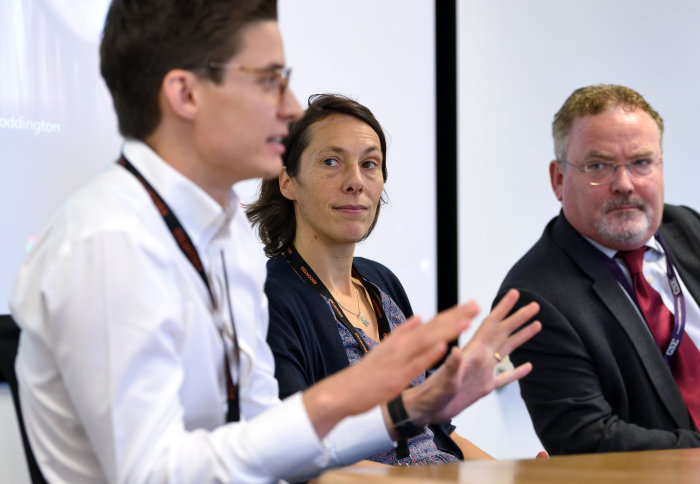UK needs ‘joined-up health and transport policy’, academics tell Government
by George Hope

Imperial academics presented their research on air quality and emissions to the Government’s Department for Transport.
The event was organised jointly as part of the department’s learning and development series, and The Forum, Imperial’s policy engagement programme.
Dr Audrey de Nazelle, from Imperial’s Centre for Environmental Policy, and Dr Marc Stettler, at the Centre for Transport Studies, led the event alongside the Department for Transport’s Chief Scientific Adviser, Professor Phil Blythe.
Holistic thinking in air quality policy
Dr De Nazelle urged the policy professionals to use integrated health impact models for better decision making in transport.

"As we look at bringing in a wider suite of policies and technologies to mitigate air quality, I think it is critical we have research like we have heard today underpinning the evidence base." Professor Phil Blythe Chief Scientific Adviser, Department for Transport
Emphasising the need to make our environments healthier, Dr De Nazelle argued that we need joined up thinking on transport policies, rather than looking at individual targets separately.
Dr De Nazelle drew from studies, such as one in Barcelona, to demonstrate the possibilities of combining traffic reduction and a shift to physical activity such as walking and cycling.
Removing 40% of car traffic in the inner city of Barcelona was found to reduce deaths by 10 per year. But replacing trips with cycling, walking and public transport led to more than six times the health benefits, equating to 67 deaths avoided.

Comparing technological approaches, such as less-polluting cars, to behavioural ones, such as cycling, Dr De Nazelle outlined another study that found that the number of deaths avoided by increasing physical activity was 30 times the number of deaths avoided by technology-driven air quality improvements alone.
Real-world vehicle emissions
Dr Marc Stettler presented his work on real-world vehicle emissions to the civil servants, highlighting the need for decision makers to have accurate information.
Stressing the need for stakeholders to lay out a standard for extracting data from existing data sets, Dr Stettler also said we can give this information to consumers so they can make an informed decision before deciding to purchase a particular vehicle.
Dr Stettler outlined his work taking advantage of machine learning techniques to incorporate vehicle and engine data so that models can be implemented in real-time. Existing emissions modelling does not accurately account for the variability of vehicles or the effect of congestion. However, more data can help us to develop better models and understand the uncertainty in our estimates.

In light of a trend towards consumers opting for larger vehicles, Dr Stettler also stated it is not just fuel type consumers need to consider, but also the size and type of vehicle.
Dr Stettler also discussed several projects from within his team at the Transport and Environment Laboratory.
Taking advantage of the pedestrianised streets at the Great Exhibition Road Festival, researchers measured air quality and found a reduction of 15% in exposure to nitrogen dioxide. This modest reduction is likely due to air travelling from other polluted roads.

Another project looked at whether Transport for London’s extension of the Jubilee Line on the turn of the millennium had a measurable effect on air quality.
They found there was not a homogenous reduction at each monitoring station, indicating that just increasing public transport does not necessarily reduce emissions. This can in part be explained by the fact that increasing access to an area also increases human and economic activity, which in turn worsens air quality.
Professor Phil Blythe, the department’s Chief Scientific Adviser, also led a Q&A session with the academics.
"We have heard some fascinating evidence of the role various mitigations can play in improving air quality and their wider impacts.
"As we look at bringing in a wider suite of policies and technologies to mitigate air quality, I think it is critical we have research like we have heard today underpinning the evidence base,” he concluded.

Professor Blythe’s role as CSA is to develop the department’s links with the wider science, engineering, technology and innovation community, and to ensure the department’s evidence is high quality. He also advises ministers and senior officials.
The Forum is Imperial’s new programme to connect Imperial researchers with policy makers to debate, discuss and discover new thinking on policy challenges. Through workshops, seminars and bespoke services, The Forum encourages the open exchange of expertise and knowledge between Imperial staff and decision makers.
Article text (excluding photos or graphics) © Imperial College London.
Photos and graphics subject to third party copyright used with permission or © Imperial College London.
Reporter
George Hope
Office of the President